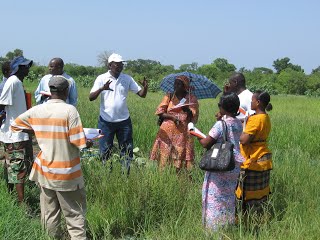With the aim of increasing the body of literature on Rural Communication Services (RCS), a group of leading universities in the field of rural communication has partnered with FAO under the umbrella of the Forum on Communication for Development & Community Media for Family Farming (FCCM).
The academics involved – from the University of Guelph, University of Reading, Wageningen University, University of the Philippines Los Baños, and the University of Queensland – have been conducting a joint research initiative to assess the evidence base for rural communication services and provide policy recommendations.
A number of illustrative cases of evaluation results have been collected for the purpose of performing a comparative analysis. Cases have been gathered from Africa, Asia-Pacific, and Latin America and the Caribbean. Initiatives include the use of mobile technology, telecentres with internet access, and radio broadcasting among others.
An example from the Asia-Pacific region is the Knowledge Help Extension Technology Initiative (KHETI) that took place in Madyha Pradesh, India. This project utilized assistants to agricultural workers to travel to villages and use mobile phone to create audio-visual Short Dialogue Strips (SDSs) to address farmers’ problems and issues. The evaluation showed that mobile technology was faster and of better quality than the previous extension services, and contributed to an increase in the use of agricultural advice by local farmers.
Another case selected is the television show Shamba Shape Up, which broadcasts episodes related to the problems faced by East Africa’s rural population across Uganda, Kenya and Tanzania. The team visits a different farm each week and addresses the specific questions of the farmers, related to topics as diverse as livestock, soil fertility, financial planning, solar power and rainwater harvesting. The estimated audience has risen to 10 million since the first series, and it is estimated that 428,566 farmers have made changes to their farming practices, or experienced increased profit or improved household food security as a result of the programme. You can read more about Shamba Shape Up in our ComDev stories section.
The study will now be subject to an internal peer review to assess the relevance and utility of the examples used. The peer reviewers will also determine whether the analysis answers the research questions and if conclusions are anchored on sufficient evidence.
The results of the peer review and the study will be collated into a working document that will be presented at the Latin American Regional Forum on Territorial Development, Innovation and Rural Communication to be held in Brasilia, Brazil, from 12-13 November.

